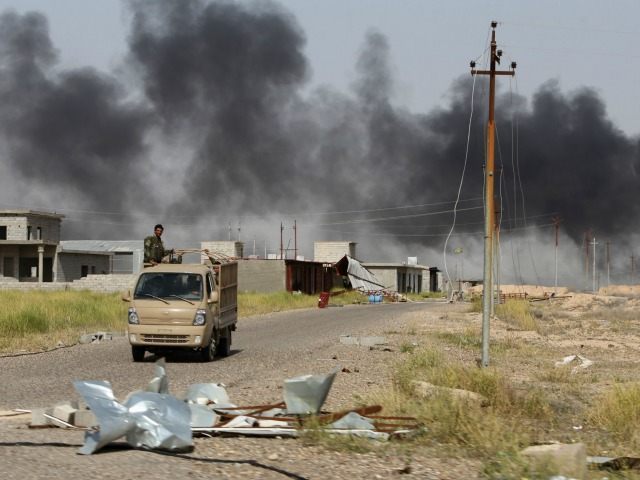An essay in this week’s issue of The Economist suggests that for the first time since its birth, the Islamic State may be running aground on financial shoals, prompting some “to ask whether IS will survive.”
A recent report from top global analyst IHS reveals that most of Islamic State funding comes from taxation in ISIS-controlled regions as well as oil revenue, and that the terrorist group’s monthly revenues are approximately $80 million worldwide.
While $80 million may appear to be an enormous sum, expenses are higher still, and the Caliphate has suffered tremendous financial setbacks in recent months due to drastically reduced oil prices and coalition air strikes that have cost IS key access to the Turkish border and profitable enterprises such as Iraq’s largest oil refinery.
Over 70% of Caliphate revenues currently go to the support of the Islamic State army, which pays a premium for foreign fighters. Foreign Arabs reportedly receive at least twice as much as local militants, while European fighters make over three times as much.
Not long after its founding the Islamic State became the wealthiest terror organization in history. Seizing vast tracts of land in 2014, ISIS looted Mosul banks to the tune of some $425m, annexed some of the most fertile agricultural land in the region, and swallowed up heavy industry, particularly petroleum assets.
A report listing Islamic State assets in October 2014 catalogs seven Syrian and 13 Iraqi oilfields, three refineries, natural gas fields, five cement plants, wheat silos and a salt mine.
“They control the bulk of Syria’s oil,” says Ludovico Carlino, author of the IHS report, “so whether you’re a militia, a civilian or a regime, you have to buy from IS’s middlemen.”
According to Dr. Rim Turkmani of the London School of Economics, part of the key to Islamic State success is precisely that it behaves as a state, adopting “a model that includes governance and the provision of public services, for example, judiciary system, policing, education, an army, an ideology and indeed intelligence.”
Like all states, ISIS relies heavily on revenues from taxation to finance its operations.
“One of the Islamic State’s main sources of income comes from taxation on economic activity and basic services, including electricity, mobile phone networks, internet access, retail, industry and agriculture, within territory it controls,” said Ludovico Carlino, senior analyst at IHS. “They charge a 20 percent tax on all services.”
Throughout its short life, ISIS has seized the prime farmlands of the Nineveh plains, auctioned off precious antiquities, invented every sort of tax, especially for infidels, and administered lucrative state infrastructure, every eager to fund its insatiable war machine.
Now, however, it appears that Islamic State coffers may be nearing empty. In January 2015, ISIS lost access to a key Turkish border crossing, as well as the massive Lafarge cement plant in Kobani, and six months later it relinquished Baiji, Iraq’s biggest oil refinery.
“According to information gathered from Arabic-language social media, and our in country source network, efforts to target the Islamic State’s sources of revenue are paying off,” said Columb Strack, senior analyst at IHS.
Early on, ISIS made a conscious strategic decision to keep itself free of dependence on external donations, preferring to develop internal revenue sources.
“Unlike al-Qaeda, the Islamic State has not been dependent on money from foreign donors, to avoid leaving it vulnerable to their influence,” said Columb Strack, senior analyst at IHS, and lead analyst for the IHS Conflict Monitor. “Our analysis indicates that the value of external donations to the Islamic State is minimal, compared with other revenue sources.”
With recent attacks from American, British, and Russian planes, Islamic State total oil production has reportedly fallen by more than 50%, from 100,000 barrels a day to less than 40,000. Local tanker traffic has greatly diminished and as has output from petroleum refining efforts.
While tax revenues are harder to target, Islamic State leaders may be reluctant to overtax their people, for fear of losing the popular support that is critical to its survival.
Whether Islamic State will find new income sources to replenish lost revenues or whether flagging finances will cripple it permanently remains to be seen.
Follow Thomas D. Williams on Twitter @tdwilliamsrome

COMMENTS
Please let us know if you're having issues with commenting.